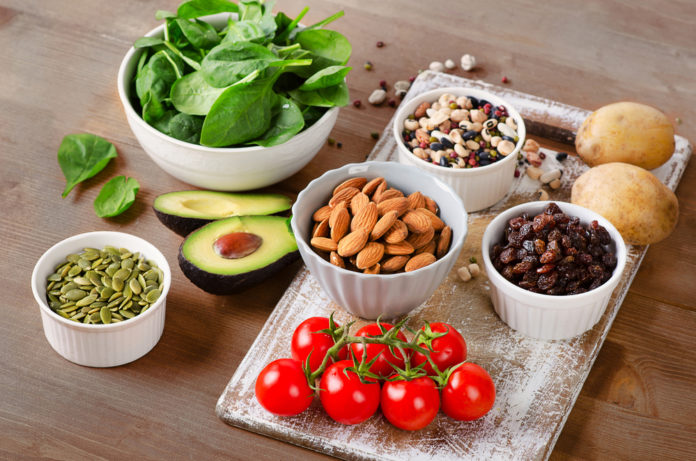The Function of Potassium
Functioning as a mineral and electrolyte, potassium helps keep the heart, kidneys, and other organs working efficiently in the body. Potassium works with sodium, another critical electrolyte, inside the body’s cells to create nerve impulse, contract muscle, and support heart function. Some research has also shown maintaining or increasing potassium intake may decrease the risk of certain health conditions and diseases, including hypertension, stroke, osteoporosis, and kidney stones.
Though recommendations can vary based on life stage and disease status, the average adult needs 4,700 milligrams (mg) of potassium daily. Low potassium, also known as hypokalemia, may cause fatigue, muscle weakness, muscle cramps and weakness, constipation, and abnormal heart rhythms. While a potassium deficiency is rarely caused by a lack of potassium in the diet, individuals can ensure adequate intake and electrolyte balance with the 14 potassium-rich foods identified below!
14 Foods High in Potassium
1. Bananas
Kicking off the list, one of the most well-known potassium sources… Bananas! One large raw banana contains about 800 mg of potassium, or approximately one fifth of total daily needs. Bananas also supply fiber, magnesium, and vitamins B6 and B12.
2. Radishes
When it comes to foods high in potassium, radishes may supply the greatest. In fact, just one cup of radishes contains over 4,000 mg, just 700 mg shy of the general recommendation! Throw raw radishes onto salads, tacos, and sandwiches for added crunch and a spicy, pungent flavor or cook them using these five tasty ways.
3. Potatoes
One medium russet, red, or white potato (with the flesh and skin) supplies around 900 mg of potassium, while a comparably sized sweet potato contains a little over 400 mg. But try to stray away from fried potatoes, as they are filled with calories and oftentimes those “unhealthy” fats, and take a bite out of these glorious grilled potatoes or these 7 healthy and delicious homemade sweet potato fries recipes.
4. Carrots
While mostly known for their contribution to good eye health, carrots supply 1,880 mg of potassium per one cup. They make a satiating snack, especially when paired with hummus, peanut butter, or this Greek yogurt ranch dip. Oh, and get a double dose of potassium (and yum) with this creamy carrot and sweet potato soup.
5. Beans
Whether white, red, black, pink, lima, kidney, or pinto, beans are a generous source of potassium, supplying an average of 2,000 to 2,600 mg per one cup. Reduce the sodium content of canned beans by rinsing before use, along with adding to this blackened tilapia with red beans and rice recipe and black bean omelet.
6. Turkey
One single turkey breast supplies 2,775 mg of potassium, along with providing lean protein. Learn how to roast a turkey and enjoy as a Thanksgiving feast or shred into soups, salads, and casseroles.
7. Apricots
One cup of fresh apricots packs 2,200 mg of potassium, along with being valuable sources of fiber and vitamins A and C shown to benefit eye, heart, skin, and digestive health.
8. Tomatoes
Tomatoes contain almost 1,900 mg per one cup, while tomato products such as soups, sauces, and ketchups are also excellent potassium sources. But when choosing those tomato-y products, it is important to be aware of the added sugar and sodium content they often come with.
9. Pistachios
Pistachios and other nuts and seeds generally pack a potassium punch, as one cup of pistachios contain almost 1,300 mg. Pistachios supply rich nutrients and vibrant color to these 21 ways to use them.
10. Avocadoes
One avocado offers about 1,200 mg of potassium, along with supplying a potent helping of healthy fat, fiber, folate, and vitamins K, B5, B6, and E. Learn more about the health benefits of avocado and how to use them beyond avocado toast here.
11. Lentils
A cup of raw lentils supplies almost 1,300 mg of potassium, along with supplying plant-based protein and fiber. Nosh on these healthier-for-you chicken and feta meatballs with lentils.
12. Plantains
Though they are considerably different when it comes to taste, plantains look like banana’s sibling and even provide comparable potassium, as one cup of plantains supplies 860 mg. But unlike bananas that are consumed raw, plantains need to be cooked before serving.
13. Blackstrap Molasses
Blackstrap molasses is one of the most nutritionally-rich sugar types, with one tablespoon supplying 615 mg of potassium. It also contains calcium, iron, and magnesium, along with being recognized as a borderline low glycemic index food, as the American Diabetes Association suggests low GI foods have a score of 55 or less.
14. Salmon
While known for its omega-3 fatty acid content, a salmon filet also provides a little over 1,000 milligrams of potassium. Pair with potassium-packed ingredients, including as fish tacos with avocado and tomato!
*Values obtained from the USDA’s National Nutrient Database






